Responses to Gaza
in Bosnia
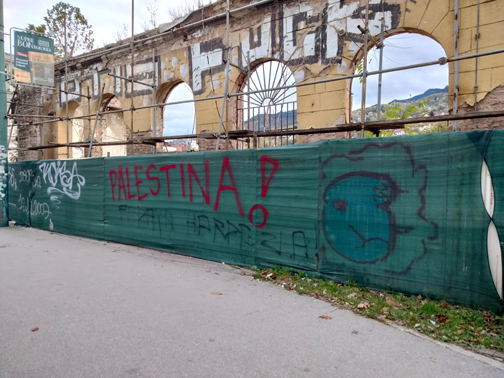
One of many
grassroots expressions about Palestine in Sarajevo, November 2023
As I arrived in Bosnia, the Israeli massacres of people in Gaza had been
underway for more than a month. The response of people in Bosnia—at least, those
in the Bosniak-controlled areas—was quite different from that of people in
Ukraine. In Ukraine on the day after the Hamas attack, you could see Israeli
flags displayed on electronic billboards in many places. And people I spoke with
were uninformed about the history between the Palestinians and Zionists. More
than once I had responses that betrayed complete ignorance about pre-October 7
history.
It was rather the opposite in Bosnia. From nearly the beginning of the Israeli
assault, people were demonstrating in protest in Sarajevo, Tuzla, and a couple
of other Bosniak-dominated locations. At noon on a mid-November Sunday I was
able to attend one of these protests, at the
Baščaršija. The square filled up within about 15 minutes.
I've never seen
so large a crowd in that space. Happily, there was no speechifying, just a mass
of people holding Palestinian flags and protest signs, mostly in English.
One sign read, "You don't have to be Muslim to support Palestine—just human."
There was chanting—also mostly in English: "Free Free Palestine," and "From the
River to the Sea, Palestine will be Free." There was a good number of Turks and
Arabs present, but mostly Bosnians. Many people wore a keffiyeh. After about an
hour, the crowd started marching along the pedestrian walkway toward Ferhadija.
They filled up that road; it took at least 15 minutes for everyone to evacuate
the square.
I asked a couple of local friends how many of these people were Bosniaks
protesting out of solidarity with other Muslims, and how much there was non-Bosniak
participation. One person, not a Bosniak, stated that there were plenty of
non-Muslims in Sarajevo who were involved in the protests, who were involved
because they were interested in human rights and they cared about Gaza. I got
different opinions from other people.
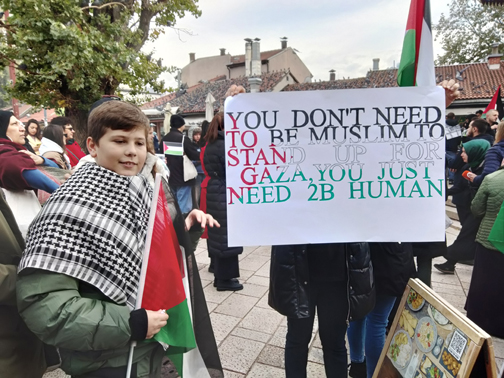
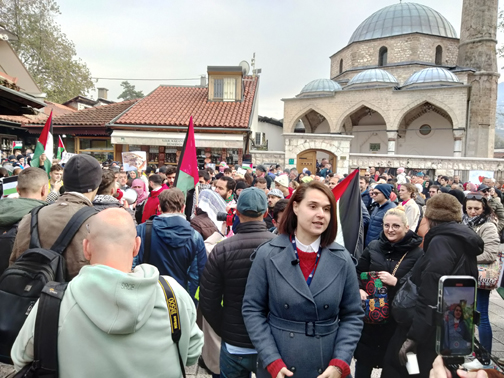
Expressions of solidarity with Gaza in Sarajevo, mid-November 2023
Following the ongoing brutality in Gaza, with the Israelis telling people to
leave the north, and then bombing them in the south, I felt in despair—as I
still do. I admired a relative who was on the scene in New York City and was
arrested with hundreds of other people in a protest at Grand Central Station.
I have had strained relationships with a couple of friends because they lost the
plot; they simply did not understand what was going on in Gaza. Some of them
called out "genocide" as if it were the Israelis who were under threat, and it
was not already happening to the Palestinians in Gaza. They found ways to
condemn the greatest victims, rather than the perpetrators. I expect to lose a
couple more friends.
This is not, of course, to exonerate Hamas, and I do not. I have never really
discerned a strategy on the part of that organization, beyond making attacks
that boost their popularity in Gaza and beyond. That has worked this time,
according to things I've read.
Trying to understand what Hamas leaders were thinking when they went and killed
nearly 1200 Israelis (a majority of whom were civilians, but not all), the only
explanation I could come up with was that they expected that the attack would
cause so much disruption that a region-wide war could bring about a complete
change of power relations in the Middle East, working in favor of the
Palestinians. So far, it has not worked out that way. There are expanding
skirmishes with Hezbollah in Lebanon, the Houthi in Yemen, and some attacks in
Iraq and Syria, but there is not evidence that the big players—Iran and the
US—wish to go at it directly. Of course, there are times that states will back
themselves into a war, and that could yet happen. For now, it is the
Palestinians who are being massacred and starved to death, with an apparent plan
for Israel to resettle an emptied Gaza afterwards.
Some activist friends I spoke with in Bosnia expressed frustration at the
demonstrations because, in contrast with the Gaza protests, it is hard to get
Bosnians mobilized to pressure their own corrupt, ethno-nationalist regime.
A friend in the Krajina said he thought that the big demonstrations are a
"populist" thing, not sincere, among the Bosniaks. He lamented that "if you go
and try to change the Bosnian government, you get five people out to a
demonstration, but people are ready to go out en masse about something they
can't change." I mentioned the more than 4,000 children killed in Gaza (to that
date), and he remarked, "And we're trying to have a commemorative monument for
102 children killed here" in the Prijedor area.
A friend in Sarajevo set me up to talk with Al Jazeera Balkans on the subject.
After a chat with a reporter, we made the interview on camera on the rooftop of
the big BBI commercial center where, under the November sunshine, I made my
opinions clear on the subject. The interview was aired for a minute or so the
next day, amidst scenes from Gaza of
men sitting huddled in blankets outdoors, and children being taken to hospitals.
A Sarajevo
friend asked me the most simple, basic question: "Why can't they just have one
state?"
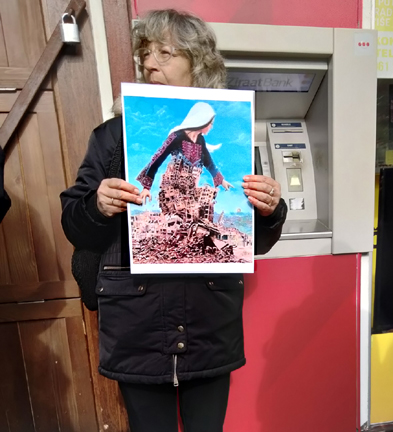
Talking about
Sevdalinka
On a lighter note, a friend of mine from Sarajevo was driving around when he
heard a Sevdalinka song being played on the radio, introduced by someone who was
talking about how this song had been performed back in the 1980s by the
well-known musicians Behka and Ljuca, but never recorded—until he, the
ethnomusicologist Damir Galijašević, "received an old recording of it from Peter
Lippman." My friend was driving along and thinking, "That Peter Lippman shows up
everywhere."
That recording has a good story. During the 1981 tour of the Radost Folk
Ensemble, I had a free evening in Sarajevo and I asked someone where I could go
and hear some old-fashioned folk music. The person told me to go to the "kineski
restoran," the Chinese restaurant. I made my way over there, up to the second
floor, and there were Behka and Ljuca sitting on a bench. Ljuca was playing a
Bosnian saz, and Behka was playing tambourine. I recorded the two of them,
playing and singing, on my little Walkman cassette player.
After I got home to the US, a couple of years later, I lost track of that
cassette for the next forty years. Then my older brother showed up with it and
returned it to me. Thus last year I sent it to one Bosnian, who put me in touch
with Damir
Galijašević. That's how the recording ended up being played on the radio. It's
not that Behka and Ljuca have not been recorded; there are plenty of recordings
of them, which
you can find on
YouTube. But Damir
considered my recording, with its low-tech flaws, to be special because he
considers that it is the only recording of the pair to have been done under
informal circumstances, where they were not tidying up their presentation to
satisfy commercial demands.
I met with Damir at a kafana in the center of Sarajevo. We talked about
Sevdalinka in the US. The first thing he asked me was about our local
nightingale Mary Sherhart, and what she was up to.
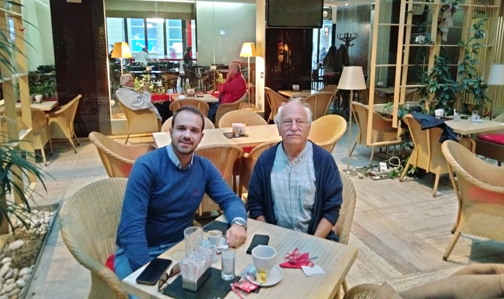
With Damir Galiašević
We talked about Himzo Polovina, my favorite male Sevdalinka singer. I had heard
him live, in Novi Sad in 1982. He died of a heart attack in 1986 in Montenegro,
after a concert. Damir told me that Himzo had been feeling poorly, and went to a
doctor. The doctor said he had to lie down immediately, but he went out and gave
a performance. Then he felt bad again, and called his wife in Sarajevo to come
get him. Then he fell over and died.
I asked if it were true that Himzo had ever been sent to Goli Otok, the penal
colony on an island, mostly used for political prisoners. Damir refuted that
rumor, but said that Himzo had been banned from performing at the radio for some
years in the early 1960s. This happened because the state-controlled radio
station asked the performers to remove material that used old-fashioned language
or evoked anything related to religion. Himzo refused to do this, so he was
politically "unacceptable" for some years. Damir also mentioned that Himzo was a
psychiatrist, and that unlike some other Sevdalinka stars, he never stopped
working at his day job.
It was only later that I learned that Damir Galijašević is a
highly talented
and
well-reputed
musician in his own right, on the accordion. You can find his music on YouTube.
Azra Zornić
Before I
left Sarajevo for the Krajina, I had the pleasure of meeting Azra
Zornić. Ms. Zornić
is one of several
people over the years who have tried and won a civil rights case at the European
Court of Human Rights at Strasbourg. In her 2014 case, she filed a complaint
because she was not allowed to run for office as a "Bosnian," but only as a
member of one of the three main ethnicities or "Other." The ECHR determined that
this prohibition was in violation of the European Union Convention on Human
Rights.
The history of this and similar Bosnian lawsuits filed with the ECHR goes back
15 years. All of these half-dozen complaints refer to the "Frankensteinish"
manner in which the Dayton constitution perpetuates ethno-nationalism at the
expense of civic democracy. I have discussed this in detail
here
in my blog; in essence, in entity and national elections one votes as a member
of one of the three main ethnicities or "Other"—and the same kind of division
determines who may be a candidate for the state-level presidency or membership
in the House of Peoples (Dom Naroda).
Thus in 2009 the Jewish leader Jakob Finci and the Romani activist Dervo Sejdić
filed a complaint with the ECHR because, given that they were neither Serb,
Croat, Bosniak, nor "Other," they were not allowed to run for the above offices.
They won their case, but the successive governments of Bosnia-Herzegovina have
never done anything to incorporate the 2009 finding, nor several after that,
into the electoral system.
In Ms. Zornić's case, she wished to have the right to be a candidate as a
"Bosnian," according to the way she identifies herself. This is neither any of
the three main ethnicities, nor "Other" (which could be Ukrainian, Albanian, or
any other minority ethnicity). "Bosnian" is the remaining, secular,
anti-nationalist identity that many people choose since the category of
"Yugoslav" was taken away. It represents the ideal for a civic state where all
people are equal regardless of ethnicity, and none are aiming to take power away
from the other. In the present Dayton-warped system, it is a long shot.
Ms. Zornić
spoke to me about
how she wished for Bosnia just to be a country of citizens, with one president
acting as a representative of them all. She feels that it is not appropriate for
either entity to be designated as the political home of any one ethnicity as
favored over another. She worries that the people of Bosnia are not behaving
intelligently, and that the original problem was that after Dayton, the leaders
did not bother to change the constitution into something that worked
democratically for everyone. I asked her how she sees a possible recovery from
this situation, and she didn't see it. I suggested grassroots organizing, though
the odds for the development of that kind of movement are not so strong.
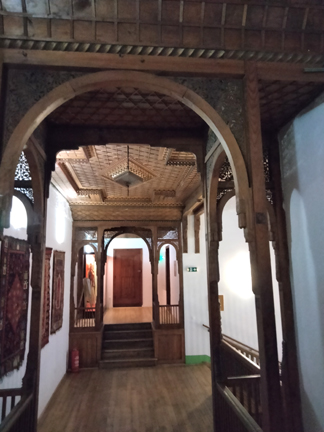
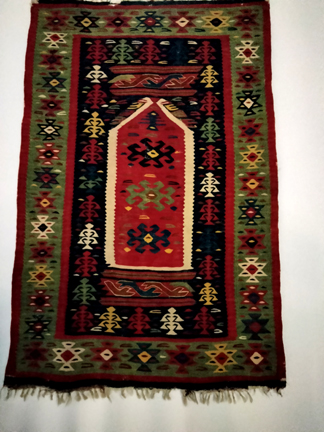
From the National
Museum: An example of the fine
Ottoman-era woodwork in more affluent households, and a traditional kilim
Journal 1:
To Bosnia from Ukraine;
Visiting Srebrenica; Memorial Center
Journal 2: Sarajevo: Bistrik; Looking for Kazani
Journal 3: Gaza in Bosnia; Sevdalinka; Azra
Zornić
Journal 4: Krajina; More on Gaza;
Environmental Activism